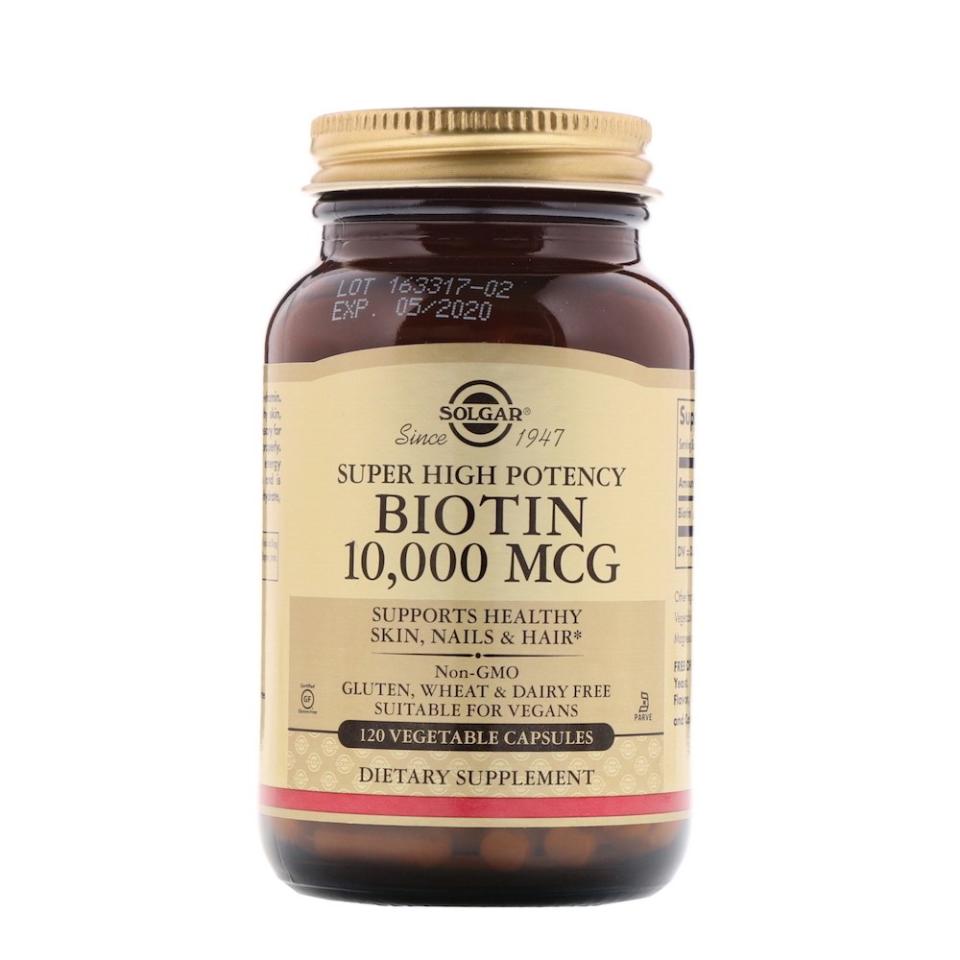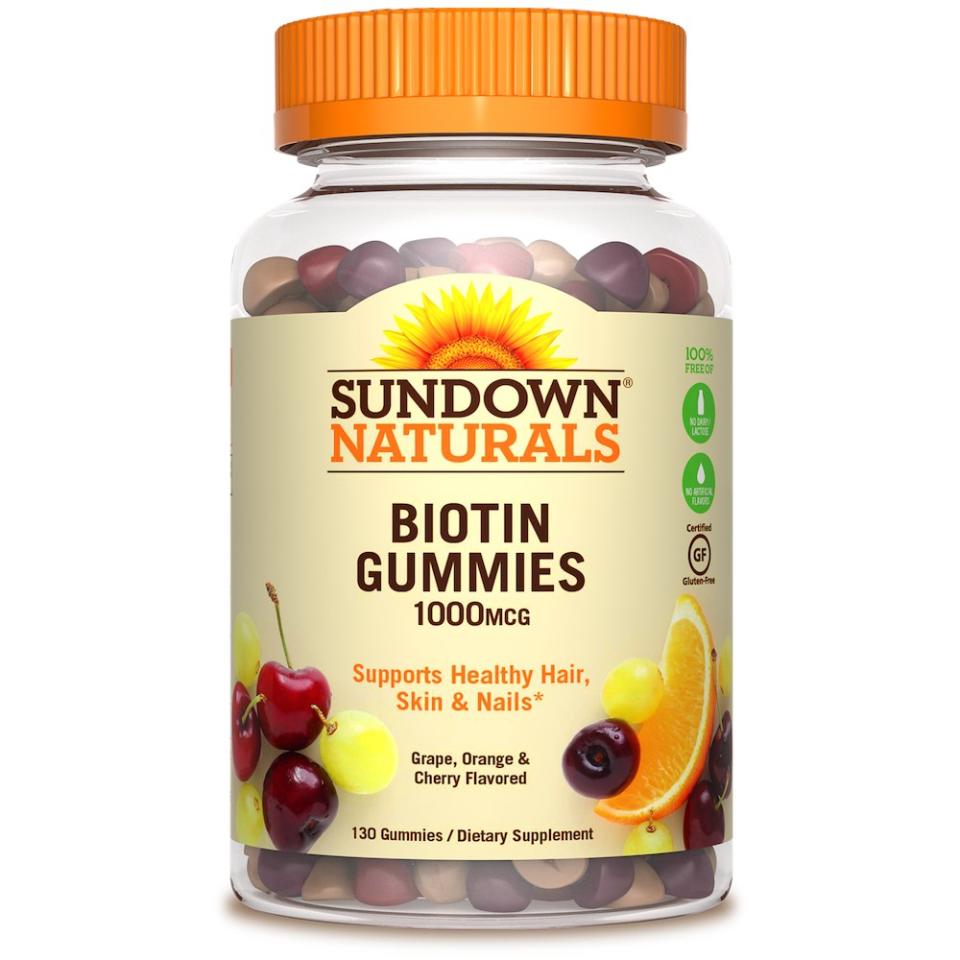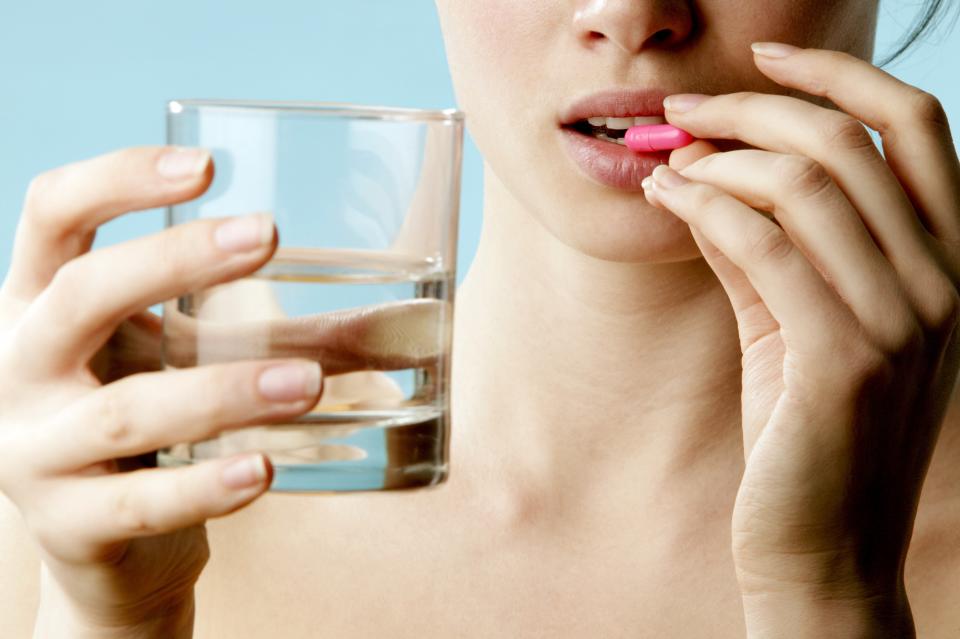The Truth About Biotin Supplements, According to Nutritionists
You may have seen ads that swear that taking biotin will give you the hair of a shampoo commercial model, a glowing complexion, or unbreakable nails. A form of vitamin B also known as vitamin B7, biotin has attracted a ton of hype — but when it comes to nutrition, it can be hard to know what's real and what's completely overblown.
"Although there isn't good scientific evidence that taking biotin supplements will help thinning hair to grow or nails to get stronger, people who take biotin supplements will often see a benefit," registered dietitian nutritionist Sonya Angelone, a spokeswoman for the Academy of Nutrition and Dietetics, tells Allure.
While much of the fascination with biotin is about what it does for hair, skin, and nails, it can do a lot more for your body than potentially improving the appearance of these three. Here's what you should know about the vitamin, plus how to tell whether taking biotin supplements is a good fit for you.
What is biotin, exactly?
This B vitamin is an essential nutrient for your body, according to the National Institutes of Health (NIH). You're probably most familiar with biotin as a supplement, but it's actually found in some foods. Meat is a big source of the stuff, specifically beef liver, but pork chops and hamburgers are good sources too, per the NIH.

Breakfast: scrambled eggs, salmon, toast and spinach
Getty ImagesFish, eggs, nuts, seeds, and dairy products contain it as well, Jessica Cording, a registered dietitian in New York City, tells Allure, and so do some vegetables like sweet potatoes, spinach, and broccoli. It can also be found in prenatal vitamins and multivitamins, per the Food and Drug Administration (FDA).
What does biotin actually do?
Biotin helps with the metabolism of fatty acids, glucose (blood sugar, in other words), and amino acids in your body, the NIH reports. In other words, biotin helps turn the carbs, fats, and proteins in the food you eat into energy you need, Angelone says. The NIH also says it plays a role in gene regulation (the process that controls how your genes get expressed) and cell signaling (the process that coordinates the actions of all of your body's cells).
It even helps maintain the normal function of your nervous system, Beth Warren, a registered dietitian nutritionist and the author of Secrets of a Kosher Girl, tells Allure. And yup, it does play a role in creating healthy nails, skin, and hair, Angelone says. (That's not to say that if you're already getting enough biotin, taking a biotin supplement will create a real difference in how yours look, though.)
How can I tell if I need more biotin?
There's actually no Recommended Dietary Allowance for biotin, so it's hard to know exactly how much you should get on a regular basis. However, the Mayo Clinic says that teens and adults should probably get anywhere from 30 to 100 micrograms a day. There are also no hard numbers on how much biotin the average American gets, but the NIH says people's average biotin intake in other Western countries is about 35 to 70 micrograms a day, within the generally recommended range.
Here's the thing: It's actually pretty rare to have a biotin deficiency if you eat a varied diet, Cording says. The Mayo Clinic specifically cites conditions like a genetic disorder of biotin deficiency, seborrheic dermatitis in babies (a skin condition that causes a scaly, itchy rash), and surgical removal of the stomach as possible causes of a biotin deficiency. A heavy drinking habit can also inhibit your body's ability to absorb biotin, the NIH says.
At least a third of pregnant women have a slight biotin deficiency, even when they have more than the average amount of it in their diet.
Things are a little different during pregnancy, though: At least a third of pregnant women have a slight biotin deficiency, even when they have more than the average amount of biotin in their diet, the NIH says. A biotin deficiency can cause a skin rash around your eyes, nose, and mouth, as well as seizures, brittle nails, and thinning hair, Angelone says.
If you suspect you have a biotin deficiency, talk to your doctor: She can order a blood test to find out whether that's the case.
What should I know about taking a biotin supplement?
For starters, many biotin supplements contain way more biotin than the generally accepted amount you need per day, with many supplements containing anywhere from 1,000 to 10,000 micrograms of biotin per pill. If you take too much biotin, it's likely that you'll just pee out what you don't need, Cording says. The NIH even says that there's no evidence that biotin is toxic at high levels.
But there's something else that's really important to keep in mind. "Taking biotin supplements might interfere with the results of many different lab tests that test the blood," Warren says. The FDA specifically warned about this in 2017, releasing a safety communication that states that biotin can "significantly interfere with certain lab tests and cause incorrect test results which may go undetected." The FDA reports that they've seen an increase in the number of "adverse events" that have been reported due to incorrect test results from biotin, including one death. That's why it's so important to let your doctor know in advance if you're taking biotin (or any supplements), Warren says.
If you're on biotin supplements and you have an upcoming scheduled blood test, Angelone recommends stopping the supplements three days before your lab work. (It's still a good idea to let your doctor know you've been taking them, though.) Biotin supplements can also interfere with medication, including anticonvulsants, so be sure to flag them to your doctor if you're taking any regular medication.
If you want to take a biotin supplement, you're probably OK to do so — just mention it to your doctor first to make sure there are no potential issues with your health. And if you're diagnosed as having a biotin deficiency, talk to your doctor about how much more biotin you'll need, plus which supplements might be right for you. Here are a few to consider.
1. Solgar Biotin 10,000 MCG

Solgar biotin
Courtesy of brandThis supplement is suitable for vegetarians and is gluten-, wheat-, and dairy-free. Since it's especially potent, it's likely best for people with an actual biotin deficiency.
$20 (Shop Now)
2. MegaFood Skin, Nails & Hair 2
These tablets contain a few extra vitamins in addition to biotin, including A, C, E, and B6. They're also easy enough to digest that you can take them on an empty stomach.
$30 (Shop Now)
3. Sundown Naturals Biotin Gummies

SundownNaturals biotin
If you'd rather chew your vitamins, Sundown Naturals has you covered with gummies in natural grape, orange, and cherry flavors.
$14 (Shop Now)
Read more stories about supplements and nutrition:
Now, watch what makes this cystic acne sufferer feel beautiful:


